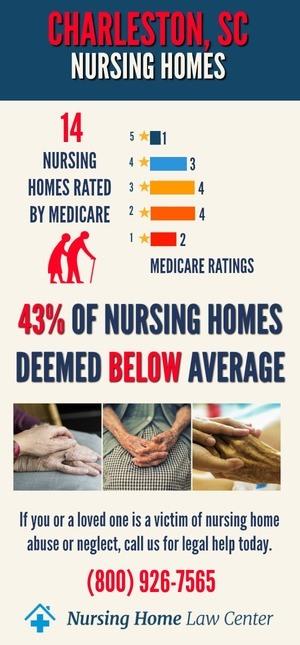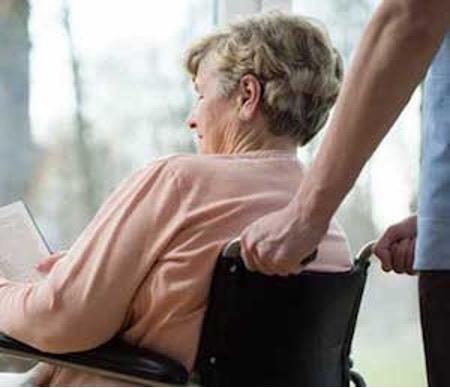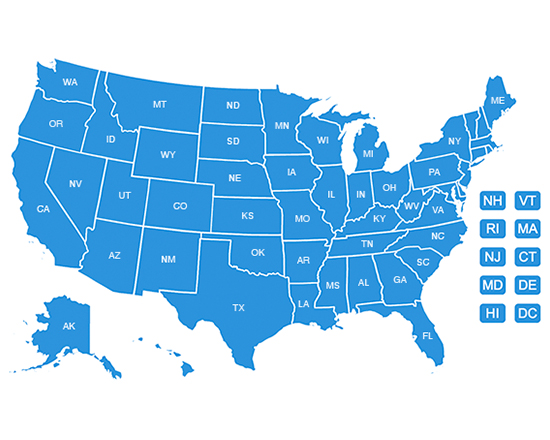The Nursing Home Law Center is committed to providing the legal resources necessary to hold negligent facilities accountable.
Charleston, SC Nursing Home Abuse Lawyer

Licensed in South Carolina
Many elderly individuals and their families trust nursing homes and assisted living facilities, expecting compassionate care. Unfortunately, some facilities fail to meet these expectations, resulting in devastating consequences.
If your loved one has suffered abuse or neglect in a Charleston nursing home, it is critical to seek help from a specialized personal injury lawyer. With the guidance of a Charleston nursing home abuse attorney, victims and their families can hold the responsible parties accountable and pursue fair compensation for the suffering caused.
Why Hire Nursing Home Law Center
At Nursing Home Law Center, we are dedicated to achieving justice and compensation for those impacted by nursing home abuse. Our knowledgeable legal team has extensive experience in handling nursing home abuse cases, approaching each with care and consistently obtaining significant settlements and verdicts for our clients.
We leave no detail unchecked in our investigations, addressing all aspects of abuse, including medical costs, emotional distress, and other damages. With our thorough understanding of nursing home abuse claims, we manage every step of the legal process effectively, fighting relentlessly to safeguard your rights.
Throughout the journey, we provide compassionate and clear communication, ensuring you and your loved ones are well-informed, supported, and confident as we pursue justice on your behalf.
Types of Cases Handled by Our Nursing Home Abuse Lawyers

Elder abuse occurs when a nursing home resident is subjected to harm, neglect, or exploitation, either through intentional actions or failure to provide proper care. This abuse can take many forms, each causing significant physical, emotional, or financial damage to the victims.
Our experienced Charleston nursing home abuse lawyers handle a wide range of abuse cases, ensuring victims and their families receive justice and compensation.
Physical Abuse
Physical abuse involves any use of force that causes bodily harm to a resident. This can include hitting, pushing, or kicking, as well as the improper use of restraints.
Mental and Emotional Abuse
Mental and emotional abuse includes any action that causes emotional distress for a resident. This can involve verbal threats, humiliation, and isolation.
Sexual Abuse
Sexual abuse involves any non-consensual sexual contact with a resident. This can have devastating physical and psychological consequences on the victim.
Medical Malpractice
Medical malpractice within nursing homes occurs when residents do not receive the proper medical treatment. Common examples include failure to prevent bedsores and medication errors.
Negligence
Nursing home neglect occurs when staff fail to meet a resident’s basic needs, such as personal hygiene, nutrition, and hydration. Lack of supervision can also lead to elopement (residents wandering off).
Financial Abuse
Financial abuse or exploitation includes the manipulation of a resident’s finances by caregivers or nursing home staff members. This could involve identity theft, fraudulent charges, or coercion.
Wrongful Death
In the most tragic cases, abuse or neglect can lead to the untimely death of a South Carolina nursing home resident. Our legal team of neglect attorneys helps families hold the perpetrators accountable in these heartbreaking situations.
Understanding Your Legal Rights
Nursing home residents in Charleston are entitled to numerous legal protections that safeguard their rights and ensure their well-being. Both federal and state laws are in place to prevent nursing home abuse, neglect, and exploitation.
These regulations hold nursing homes and assisted living facilities accountable for providing vulnerable residents with a safe and caring environment.
The Nursing Home Reform Act of 1987 is one of the most important federal laws protecting residents. This law requires nursing homes receiving Medicare or Medicaid funding to meet specific standards of care.
Under this act, residents have the right to receive proper medical care, live free from physical and psychological abuse, and maintain their dignity and privacy. The law ensures residents are informed about their medical conditions and have the right to participate in decisions regarding their care.
The Nursing Home Reform Act also mandates that facilities provide adequate staff and prevent unnecessary physical or chemical restraints. When these standards are not met, and elder abuse or neglect occurs, facilities can be held legally responsible.
In addition to federal protections, South Carolina law provides safeguards for residents of nursing homes and assisted living facilities.
The South Carolina Department of Health and Environmental Control (DHEC) oversees the regulation and licensing of these facilities. State laws ensure nursing home residents are protected from physical abuse, financial exploitation, and neglect. These regulations address staffing shortages, ensuring facilities maintain enough staff to care for residents properly.
Eligibility to File a Nursing Home Abuse Claim
If a nursing home resident is a victim of abuse or neglect, they have the right to pursue legal action. If the resident is incapacitated, a legal guardian or family member with power of attorney can file a claim. In cases where a resident has died due to nursing home abuse or neglect, family members may file a wrongful death lawsuit.

Liability in Nursing Home Neglect and Abuse Cases
In nursing home neglect cases, responsibility may fall on multiple parties. Various individuals or entities may contribute to the elder abuse and neglect of a nursing home resident, and holding all responsible parties accountable is crucial for securing justice. Below are examples of parties that may be liable in Charleston nursing home abuse cases:
- Nursing Home Staff Members: Nursing home staff members, such as nurses, caregivers, or assistants, may directly commit physical abuse, emotional abuse, or neglect. Whether through negligence or intentional harm, South Carolina staff members can be held accountable for the suffering inflicted on residents, including sexual abuse.
- Nursing Home Administration: South Carolina facility management or administrators may be liable if they fail to train or supervise employees, leading to abuse. Administrators are also responsible for maintaining proper staffing levels and ensuring a safe environment to protect nursing home residents, meaning they can be held accountable for staffing shortages or negligence in hiring processes.
- Medical Providers: Doctors, nurses, or other healthcare professionals in the facility can be held liable for medical malpractice.
- The Nursing Home Facility or Ownership: The South Carolina nursing home itself, or the parent company that owns the facility, may be held responsible if the abuse stems from systemic issues such as underfunding, poor oversight, or dangerous policies. Pursuing the facility or its ownership group can often lead to larger settlements or verdicts.
How Our Charleston Nursing Home Abuse Attorneys Can Help
At Nursing Home Law Center, our experienced team of Charleston nursing home abuse attorneys has a long history of successfully representing victims of South Carolina nursing home abuse and neglect.
We understand the emotional and financial toll these cases take on families, and we are committed to securing justice for those who have suffered abuse in nursing homes or assisted living facilities. Our firm has handled countless nursing home abuse and neglect cases, ensuring clients receive the compensation they deserve for their injuries and suffering.
Here are the services we provide to help you navigate the legal process and pursue justice:
Free Case Evaluation
We offer a free consultation to assess your case. During this initial evaluation, our attorneys will listen to your concerns, review the details of the abuse and neglect, and provide clear guidance on the next steps. This consultation allows you to understand your legal options without any financial obligation.
Case Investigation
Our legal team conducts a thorough investigation into the suspected abuse and neglect. This involves gathering medical records, interviewing witnesses, reviewing the nursing home’s policies, and examining any relevant documents to uncover the full extent of the abuse.
We work with medical experts to assess physical injury, emotional distress, and other damages suffered by the victim.
Filing the Claim
Once we have collected enough evidence, our attorneys will file the formal nursing home abuse claim on your behalf. We ensure all legal paperwork is completed properly and filed within the appropriate deadlines. Our goal is to hold all liable parties accountable for their actions.
Settlement Negotiation
Many nursing home abuse cases are resolved through settlements without the need for a trial. Our attorneys are skilled negotiators who will work tirelessly to reach a fair settlement that covers medical costs, emotional distress, and other damages. We will ensure you are fully compensated for the harm suffered by your loved one.
Trial Representation
Our team is fully prepared to take your case to trial if a fair settlement cannot be reached. Our attorneys are experienced trial lawyers who will aggressively advocate for your family’s rights in court. We will present a compelling case to the judge and jury, ensuring your loved one’s abuse is exposed and justice is served.
Common Signs of Elder Abuse Among Nursing Home Residents
If you notice any of the following signs, it may be time to consult a Charleston nursing home abuse lawyer to investigate further and take legal action if necessary.
- Unexplained injuries: Bruises, cuts, broken bones, or fractures that cannot be reasonably explained by staff.
- Marks from restraints: Evidence of improper use, such as bruises or abrasions on wrists or ankles.
- Bruising or injuries around sensitive areas: May be a sign of sexual abuse.
- Bedsores (pressure ulcers): Bedsores develop when residents are not repositioned regularly.
- Worsening of existing medical conditions: Patients may have worsening conditions if they are neglected or don’t receive their medication. New conditions can also be due to neglect of personal hygiene.
- Personal hygiene neglect: If a resident appears unwashed or has dirty clothing, it may be due to negligence at the nursing home.
- Malnutrition or dehydration: Residents may have symptoms of dehydration or sudden weight loss because they aren’t eating.
- Sudden mood swings or withdrawal: Mental abuse and neglect can cause a resident to withdraw from social activities or exhibit a drastic behavior change.
- Avoidance of specific staff members: A resident showing signs of agitation or fear around specific caregivers may indicate physical or psychological abuse and neglect.
- Unexplained financial transactions: Sudden changes in the nursing home resident’s financial situation, such as withdrawals or changes in a will.
- Missing personal belongings: Items such as jewelry or other valuables disappear from the resident’s room.
The worst-rated nursing homes in Charleston [1] include:
| Ashley River Healthcare | Johns Island Post Acute |
| Riverside Health and Rehab | Sandpiper Post Acute |
| The Reserve Healthcare and Rehabilitation |
What to Do If You Suspect Nursing Home Abuse
If you suspect your loved one is a victim of nursing home abuse and neglect, it’s essential to act quickly to ensure their safety and protect their rights. Below are the critical steps you should take if you believe abuse is occurring.
Call 911 if Immediate Danger Is Present
If your loved one is in immediate danger or requires urgent medical attention due to abuse, contact 911 right away. Emergency services can step in to ensure their safety and document any evidence of the abuse.
Report to the Nursing Home Administrator or Management
If the situation is not life-threatening, report your concerns to the nursing home administrator or management. This gives the facility an opportunity to address the problem. Be sure to document your report in writing and keep copies for your records. If management fails to take appropriate action, escalate the issue.
File a Complaint with Your Local Ombudsman’s Office
Every state has a long-term care Ombudsman who advocates for nursing home residents and assisted living facilities. The Ombudsman’s role is to investigate complaints of abuse, neglect, or poor living conditions and work to resolve these issues within the facility.
In South Carolina, you can contact your local Ombudsman’s office to file a formal complaint and initiate an investigation into the care your loved one is receiving.
Contact a Nursing Home Abuse Lawyer
It is essential to contact an experienced nursing home abuse lawyer to explore your legal options. An attorney can help guide you through the process of filing a nursing home abuse case, investigate the abuse, and hold the responsible parties accountable.
Legal representation is crucial for protecting your loved one’s rights, and you can seek compensation for the harm they have endured.
Damages You Can Recover Through a Nursing Home Abuse Claim
When nursing home residents suffer from nursing home abuse or neglect, the victim and their family have the right to seek compensation through a nursing home abuse claim. Several types of damages may be recovered.
Economic damages refer to the measurable financial losses resulting from the abuse or neglect. These may include:
- Medical expenses
- Relocation costs
- Lost wages
- Funeral expenses
Noneconomic damages compensate for the emotional and psychological impact of the abuse. Examples include:
- Pain and suffering
- Emotional distress
- Loss of enjoyment of life
- Loss of companionship
Punitive damages are awarded in cases of particularly egregious or reckless behavior by the nursing home or its staff. Unlike economic and noneconomic damages, which are meant to compensate the victim, punitive damages are intended to punish the responsible party and serve as a deterrent to prevent future abuse.
The Cost of Hiring a Charleston Nursing Home Abuse Attorney
At Nursing Home Law Center, we understand the financial burdens families face when dealing with nursing home abuse. That’s why we offer our services on a contingency fee basis. This means you will not pay any legal fees upfront. Our law firm only gets paid if we successfully recover your compensation through a settlement or court verdict.
You Have Limited Time to Take Legal Action in Charleston
In South Carolina, the statute of limitations for filing a nursing home abuse claim is typically three years from the date the abuse occurred or was discovered. Failing to file a claim within this time frame can result in losing your right to seek compensation and hold the responsible parties accountable.
Given the complexity of nursing home abuse and neglect cases, it’s essential to consult with a Charleston nursing home abuse lawyer as soon as possible to ensure your claim is filed on time and your loved one’s rights are protected.
Contact a Charleston Nursing Home Abuse Attorney Today!
At Nursing Home Law Center, our experienced team of South Carolina nursing home abuse attorneys is dedicated to protecting the rights of victims and their families.
We have a proven track record of handling nursing home abuse cases with care, achieving significant settlements and verdicts for nursing home abuse victims. Our firm is committed to seeking fair compensation for those mistreated in South Carolina nursing homes and assisted living facilities.
Call us at (800) 926-7565 or fill out our contact form for your free consultation.
References: [1] Medicare


